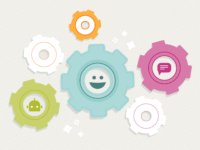In a world altered by the pandemic, we find ourselves reevaluating many aspects of our lives. One such aspect that has come into sharp focus is employee well-being. Supporting an employee’s well-being is no longer about just providing basic healthcare or gym memberships. Instead, it encompasses leaders prioritizing mental health and holistic health. Companies are reinventing their approach to employee support, moving towards comprehensive programs that include stress management, financial wellness initiatives, flexible work arrangements, and more. Integrating these programs could be challenging at first. Thankfully, there are tools and resources, like Bonfyre, that can help you streamline all of these initiatives. Here are some tips for putting the mental and holistic well-being of your employees first.
Why Prioritizing Mental Health and Holistic Well-Being for Employees Matters
Prioritizing mental health and holistic well-being for employees matters has become a top employee engagement trend of 2024. Nearly 45% of workers feel their employers don’t support their well-being adequately. These perceptions could lead to employees being dissatisfied in their current work environment, resulting in top talent looking for another job.
In order to best support your talent roster’s mental health and holistic well-being, you must first understand what these concepts are.
Mental health refers to our emotional, psychological, and social well-being. It affects how we think, feel, and act.
Whether virtual or in-person, employees should be able to manage stress effectively, contribute creatively, interact positively with colleagues, and perform their duties to the best of their abilities.
Holistic well-being, on the other hand, takes a more comprehensive approach. It encompasses multiple aspects of our lives, including physical, mental, emotional, and even financial well-being.
For many employees, work can be a source of physical and mental stress. It’s our job as leaders to lessen these burdens for employees so they can perform optimally.
How to Nurture Mental Health and Holistic Well-Being for Employees
When companies prioritize mental health and holistic well-being, they are investing in a supportive work environment where employees feel valued and cared for. This not only boosts morale but also leads to increased loyalty, reduced turnover, and improved performance, all of which contribute to the overall success of the organization. Here are some tips for promoting the wellness of your employees.
Support Stress Management
In an increasingly remote workforce, supporting stress management for employees is an urgent task for employers. Creating an environment where employees can openly discuss their stress levels and mental health is also crucial. Regular check-ins, team meetings, or anonymous surveys can give valuable insights into what employees are experiencing.
Make mental health resources such as online therapy options and wellness programs readily available for all team members. Also, consider organizing workshops on stress management techniques like mindfulness or yoga. Many of these services can be provided in person or virtually.
Encouraging regular physical activity is another effective stress management tool. Simple reminders for employees to take a break and move around during the workday can make a significant difference.
Bonfyre can be instrumental in this process. It allows employers to deliver targeted wellbeing content such as mindful meditations or movement reminders. These timely prompts can significantly aid in managing stress and promoting a healthier, more balanced work-life integration.
Employee Financial Wellness Initiatives
One of the most common causes of stress for adults is finances. When employees are worried about their finances, they may struggle to focus on their work, leading to reduced performance and increased stress levels.
Employee financial wellness initiatives are programs designed to assist employees in managing their finances effectively. These programs aim to empower employees to make informed decisions about their financial futures.
Examples of financial wellness initiatives for employees include:
- Educational materials about spending practically and saving money
- 401k plans and employee stock purchase programs
- Offering workshops on debt management and retirement planning
Bonfyre is an excellent resource for promoting these new initiatives. Employers can use Bonfyre as a hub to host educational materials and 410k options. You can also launch broadcasts to announce company-specific programs like retirement plans and matching contributions.
Provide Flexible Work Arrangements
Flexible work arrangements have emerged as a powerful tool for supporting employee mental health and overall well-being.
Common types of flexible work arrangements include:
- Flexible start and end times
- Compressed work weeks
- Job sharing
- Working remotely
Flexible work arrangements provide employees with a greater sense of control over their schedules. Being lenient with attendance expectations may reduce the stress associated with trying to balance personal responsibilities and work commitments. This can be particularly beneficial for employees juggling childcare or eldercare duties, continuing education, or managing health issues.
Secondly, flexible work arrangements can also help reduce commute-related stress. By allowing remote work or staggered hours, employees can avoid peak traffic times, which not only saves time but also reduces the anxiety and fatigue associated with long commutes.
Thirdly, these arrangements can lead to improved job satisfaction. When employees feel that their employer understands and accommodates their needs, it can boost morale, foster loyalty, and increase productivity.
Finally, flexible work arrangements support mental health by providing opportunities for rest and rejuvenation. Burnout is a significant risk in today’s high-pressure work environments, and having the flexibility to take breaks when needed can help prevent it.
Reinforce Good Behaviors with Rewards
Reinforcing good behaviors with rewards is a powerful tool that can significantly benefit mental health and holistic well-being. According to principles of positive reinforcement, when certain behaviors result in a positive outcome, these behaviors are likely to be repeated in the future.
Feeling valued and recognized for one’s contributions is a fundamental human need, and when this need is not met, it can lead to feelings of demotivation, dissatisfaction, and stress. In the workplace, employees can often feel underappreciated, which can negatively impact their mental and physical health.
Recognizing and rewarding good behavior can address this issue. It not only encourages the repetition of positive actions but also boosts employee morale and job satisfaction. When employees see that their efforts are rewarded, it fosters a sense of accomplishment and self-worth, contributing to their overall mental well-being.
Small gestures can go a long way. Even simple forms of recognition, such as a thank you note or a shout-out in a team meeting, can make employees feel appreciated. However, tangible monetary rewards can also play a significant role in reinforcing positive behavior.
With over 1,000 gift cards to choose from, Bonfyre gives employees the freedom to select a reward that is meaningful to them. This not only reinforces the desired behavior but also provides a personal touch, showing employees that their unique preferences and interests are valued.
Check-in with Employees Regularly
In today’s fast-paced work environment, the simple act of checking in with employees can have a significant impact on their overall satisfaction, engagement, and productivity. A genuine “how are you?” can go far in making employees feel valued and heard.
Maintaining an open line of communication with employees is crucial for fostering a positive and productive work environment. Regular check-ins, constructive feedback, and open dialogues not only enhance transparency but also demonstrate that the organization values its employees’ perspectives. This can boost morale, increase job satisfaction, and foster a sense of belonging.
Survey Them for Input
Regular surveys can be a powerful tool in monitoring employee mental health and satisfaction. They provide a platform for employees to voice their concerns, share their experiences, and suggest improvements.
This feedback can be invaluable in shaping and refining your company’s wellness initiatives. For example, you can use Bonfyre to launch quick polls that assess employees’ feelings about initiatives, protocols, and other opinions. This allows you to gather real-time feedback and analyze results swiftly, ensuring that your approach to employee well-being remains responsive and effective.
Putting Mental and Holistic Well-Being First
Remember, a healthy and satisfied workforce isn’t just good for the individuals; it benefits the entire organization. When employees feel supported in their mental and holistic well-being, they’re more likely to be engaged, productive, and loyal to the company. Always support your employees’ mental and holistic well-being. It could make all the difference in fostering a positive and supportive workplace culture.









